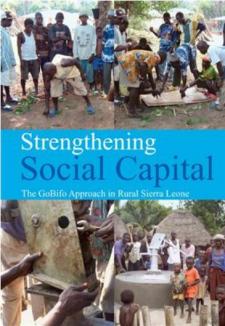Capacity development for governance and decentralization

Ga direct naar: Zoeken | Hoofdmenu | Snelkoppelingen
You are here: Home » KIT Information & Library Services » ILS Information products » CAPACITY DEVELOPMENT FOR GOVERNANCE AND DECENTRALIZATION
KIT Dossier Capacity development for governance and decentralization
Local governance training &cetera
- Approach
- Developing appropriate tools and approaches for local governments
- Tailor-made training and learning trajectories
- Knowledge development and policy debate - KIT projects
- KIT publications
The increased focus on decentralization reforms and good local governance is explained by its potential contribution to improving social service delivery, natural resources management, and local economic development, all factors that are important for achieving the Millennium Development Goals and improving rural livelihoods. KIT supports decentralization processes and works to realize ‘good governance’ at the local level. The capacity development programme covers recent thinking about decentralization, local governance and participatory and inclusive rural development and introduces the most up-to-date methodologies and approaches for tool and policy development, training and advice.
Approach
Developing appropriate tools and approaches for local governments
The capacity of newly established local governments is often constrained; this includes a shortage of qualified staff and equipment, a lack of effective management systems and the absence of accurate and comprehensive local data on which to base development planning. The lack of coordination and communication skills, in particular in rural areas, is a major obstacle to a transparent and accountable local government system. KIT contributes to capacity strengthening of local governments in the fields of planning, communication, (conflict) management, monitoring, evaluation and in integrating local economic development, social development and sustainable natural resource management.
Tailor-made training and learning trajectories for intermediary organisations to facilitate decentralisation
KIT contributes to capacity development of organizations which support the decentralization process and local governments at the local level; namely, civil society, NGOs, Local Government Associations, local capacity builders, the central government and sector ministries’ institutions at the local level. Training and learning aim to develop capacities of practitioners, policy-makers and programme managers to:
• Engage in and strengthen effective and inclusive stakeholder platforms which ensure dialogue and collaboration between local institutions;
• Analyse the institutional context of decentralization and local governance and develop a vision, policy or strategy to improve the involvement of different actors in local governance and rural development (including social service delivery, natural resource management, economic development, conflict management);
• Identify and formulate specific strategies, approaches and plans to support lobby and advocacy, citizenship, gender and participation;
• Monitor and evaluate sub-national and local development programmes and projects.
Knowledge development and policy debate
• Monitoring progress of decentralization in rural areas in order to identify lessons learned and areas for attention;
• Supporting the operationalization of decentralization reforms by documenting good practice and inform policy on emerging issues and challenges;
• Stimulating dialogue and evidence-based debate at national and regional levels;
• Promoting debate, discussion and training in selected countries and in the Netherlands on these issues.
KIT projects
1. Rural decentralization and local governance training course.
Cooperating with Wageningen International, KIT facilitates training courses in the Netherlands for francophone African participants (since 2004), Anglophone participants (since 2009) and on-demand tailor-made courses (Burkina Faso 2005, Morocco 2008).
2. French course on decentralization and local governance.
Cooperating with SNV, KIT facilitated two courses for francophone African participants in Mali (2005).
3. Decentralization and local governance
A two-year learning trajectory including a series of workshops for ICCO partners in Mali (2006-2007) and Madagascar (2008-2010) and for Cordaid partners in Cameroon.
4. Community Driven Development.
KIT supports the World Bank’s African Community Driven Development Programme through facilitation of training courses and workshops (Burkina Faso, Benin, Sierra Leone, Senegal, Uganda, Gambia, Guinea and Nigeria).
5. Policy development through publications.
KIT organizes write workshops for partners in the South.
6. Support programme for institutional and capacity development (SPICAD)

Related items
Snelkoppelingen
Agenda News Press Working at KIT About KIT Cookies Contact
Nederlands -English



